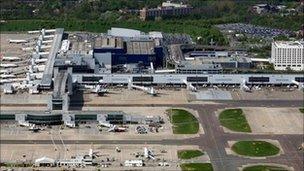Gatwick Airport masterplan: Living under the flightpath
- Published

Global Infrastructure Partners has set out its vision for developing the airport up until 2020
A long-term plan for Gatwick to become "London's airport of choice" has set alarm bells ringing among residents living under its flightpath.
The West Sussex airport's owners have set out a vision to develop the airport up to 2020 and beyond by accommodating an additional 44,000 flights a year.
They say they can expand without significantly increasing noise levels.
But David Baron, who lives in Hever, Kent, 12 miles from Gatwick, said the situation was "bad enough as it is".
Mr Baron has lived in the village near Sevenoaks for 12 years and founded Gatwick Anti-Noise Group.
He said: "Aircraft are coming in at 3,000ft, every two minutes, approaching 70 decibels. It's destroyed the environment.
Less fuel-hungry
"During the summer, if you want to sit in the garden, you can't hold a conversation or relax. It's just constant noise all the time.
"Unfortunately, the aviation industry has a way of getting its own way. They just want to get as many planes as possible."
Mr Baron said when he first moved to Hever it was "really quiet" but the problem of noise got worse as flightpaths were changed and the number of flights increased.
He said: "If it was on the market as it is now we would not have considered (buying) it. Twelve years ago it was idyllic."
Gatwick's owners, the US-based investment fund Global Infrastructure Partners (GIP) has begun a three-month consultation on the masterplan, which replaces one put forward by the airport's previous owners, BAA, in 2006.
The company believes the airport can accommodate additional flights by using its existing resources more efficiently.
Improving access routes, for example, will reduce the time pilots spend waiting on the runways.
Other plans include improving the check-in and security facilities and using larger aircraft.
The airport said it did not anticipate a significant increase in noise as emerging technology was leading to quieter engines.
Aviation expert John Grant said the plans were challenging but possible.
Mr Grant, of the airport consultant company ASM Global, said it was "perfectly feasible" noise levels would not increase as airlines had a financial incentive to use less fuel-hungry engines.
The new Airbus model has been fitted with an engine that is about 15% quieter, he said.
Campaigners, however, are worried about the figures.
The airport forecasts the number of passengers will rise from 31.6m to 40m a year by 2020 and the number of flights will increase from 242,000 to 286,000.
'Serious threat'
By 2030, the airport wants to accommodate 45m passengers a year.
Stewart Wingate, the airport's chief executive, said: "Our ambition is to compete to grow and become London's airport of choice."
The company says it can achieve its targets without the need for a second runway, which would not be allowed before 2019 under a long-standing deal with West Sussex County Council.
However, it does not rule out doing so "sometime in the future" if passenger numbers continue to grow.
Land surrounding the airport will be safeguarded for such a scenario.
Brendon Sewill, who chairs the Gatwick Area Conservation Group (GACC), said a second runway would be opposed by hundreds of thousands of people from across Surrey, Sussex and Kent.
He said: "If that were ever to become a serious threat it would be fought tooth and nail.
"But we believe it will never happen. It is government policy that no new runways should be built in the South East.
"The official forecasts show that the London airports will not be full until 2030 and it would make no commercial sense to build a new runway while there is still unused capacity.
"Nevertheless, by merely publishing a plan for a new runway, the airport will cause anxiety and blight to many people who will find it more difficult to sell their houses."
Residents and passengers can have their say by visiting the consultation website., external
- Published14 October 2011
- Published11 October 2011